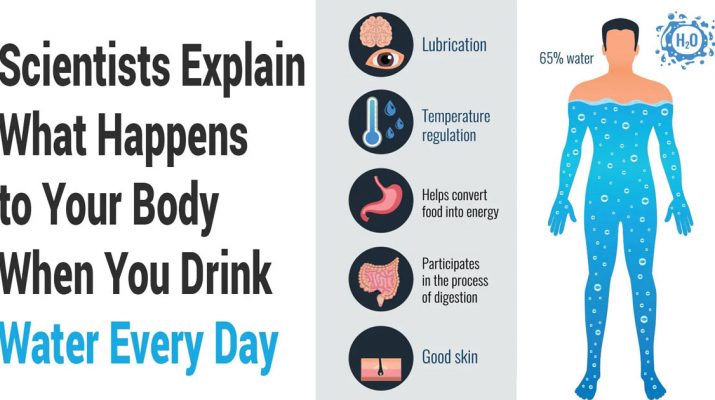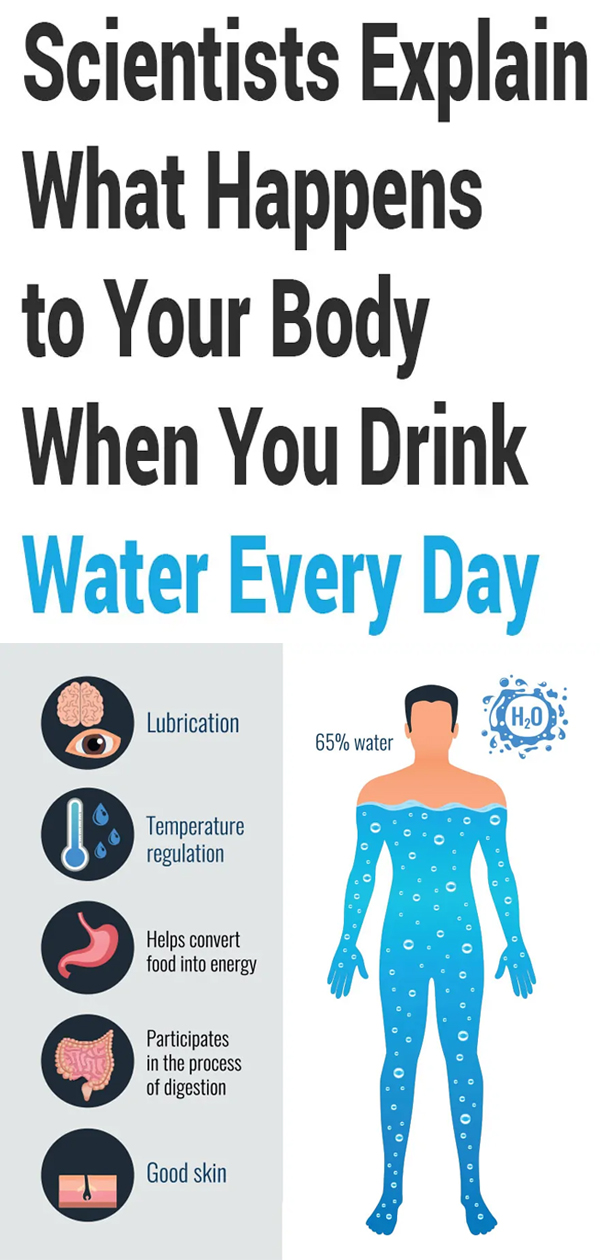Water is such an essential component of our biology that we could die within three days without it. What else would you expect considering that, on average, 60% of our body weight is made up of water? Making sure to drink water isn’t just a necessity to stay alive, but also serves to benefit our bodies in multitudes of ways. Some of those ways may surprise you.
Science has explained 10 things that happen to our bodies when we drink enough water every day.
Where Does All Our Water Go?
We all hear that we are supposed to drink 8-10 cups of water a day. That’s a simplified way to put it, and the easiest way to remember. According to the Mayo Clinic, women need 11.7 cups or 2.7 liters, and men need 15.7 cups or 3.7 liters. Those numbers are not set in stone, however. There are variables that must be considered to allow for some flexibility.
- Are you exercising? It is recommended that a person should drink water before, during, and after a workout in addition to the usual amount of daily intake. This is to accommodate for sweating, which will excrete water from your body. It also aids in replacing minerals lost.
- The type of environment or climate you are in. If you are in a hot, dry or humid climate, then hydration will be more important than a cool, moist area.
- Are you sick? Having a fever, vomiting, or diarrhea can cause you to lose bodily liquids quickly. It is essential to drink water when you have these symptoms to ensure that you do not dehydrate. Having bladder infections, kidney stones, and urinary tract infections will also require more water to help flush out your body.
- Are you breastfeeding? A woman who is breastfeeding must increase water intake to about 13 cups of water a day according to The Office on Women’s Health.
The really good news about the amount of water that we need is that we aren’t limited to only drinking water. There are some delicious foods that contribute to our daily amount.
Below Is A List Of The Highest Water-Based Foods:
- 90-99% water-based foods: cantaloupe, strawberries, watermelon, lettuce, cabbage, fat-free milk, celery, and squash.
- 80-89% water-based: yogurt, fruit juice, apples, grapes, carrots, pears, pineapple, cooked broccoli, oranges
- 70-79% water-based: bananas, avocados, cottage cheese, ricotta cheese, cooked corn, baked potato, and shrimp.
While drinking water is essential, do not mistakenly believe that we can never drink too much water. You most definitely can drink too much.
Excessive water will result in diluting the amount of sodium in your blood because your kidneys are unable to rid the body of the extra water. This is called hyponatremia and it can be life-threatening. Fortunately, it is not very common. Yet there are internet contests regarding “who can drink a gallon of water a day.”
Even if you are “only” consuming a gallon of water, you do not include the potential 20-30% of the water from food or other drinks containing water. Please, be aware that it is possible and dangerous to drink too much water.
How Do I Know If I Need To Drink Water More Often?
There are certain biological warnings our bodies give us if we have neglected to drink enough water. One of the most common signs is the color of our urine. Your urine is supposed to be light yellow or almost clear. Urine that comes out a darker shade of yellow or almost orange and has a strong odor is a big sign that you need to consume more water.
A few of the other signs of dehydration include:
-
Feeling Tired.
Our entire body needs water, including our blood. When we don’t drink enough, our blood thickens and causes undue stress for the heart to pump oxygen and nutrients to the rest of the body. As a result, we feel fatigued.
-
Dry Skin.
Be kind to the largest organ on your body, and it will help you look younger. In order for our skin to maintain its elasticity, it requires moisture. Lotion or oils only provide moisture to the first layer of skin. Water is what truly keeps it hydrated.
-
Less Urination.
When you take in less water, your kidneys attempt to hold onto what water it has to ensure you don’t dehydrate. As a consequence, you will not urinate as often. This can lead to urinary tract infections as the body isn’t flushing out the toxins and bacteria. This can also lead to water retention.
-
Muscle Weakness.
As our body is pushed to survive on less water, our bodies begin to pull water from our muscles. This may cause our muscles to release a chemical that begins to break down our muscles.
Should you not consume enough water over a period of time, various conditions could arise, which can have serious consequences for your overall health. Additionally, you can be dehydrated and not “feel” thirsty. This is because your brain has decided that for whatever reason, you must not need the signal since you have previously ignored it for an extended period of time.
The only way to flip the switch back on is to push yourself to drink consistently again.
What Happens To My Body When I Make Sure To Drink Water Every Day?
Drinking enough water every day isn’t a fad concept. Legitimate scientific evidence points out how crucial it is to our overall health. Medical News Today pinpoints some of the top reasons:
1. Lubricates Joints.
You probably don’t associate water with your joints, but they are comprised of about 80% water. Drinking enough water ensures that your joints retain their shock-absorbing ability.
2. Forms Saliva And Thins Mucus.
Saliva is necessary to digest our food and aids in decreasing cavities and bad breath. It is important that our mucous membranes stay hydrated to keep our eyes, nasal cavities, and mouth moist. Additionally, if you have sinus problems, staying hydrated helps to loosen mucus, allowing it to drain easier and prevent congestion.
3. More Energy.
More water equals better blood flow and more oxygen. Water is necessary to prevent our blood from thickening, which strains our heart and adds further pressure on the cardiovascular system. Our entire body relies on nutrients and oxygen being carried to all the tissues, organs, and our brain in order to operate adequately. When our body is working at 100%, we feel better and have more energy.
4. Healthy Skin And Hair.
As mentioned above, the majority of the hydration our skin receives is from the water we drink. When we are drinking enough, proper oils are released to moisten skin; therefore, our skin has a more filled-out appearance with a healthy glow. Additionally, we have better blood flow to our faces and limbs, which adds color and stimulates collagen production. Releasing oils and increased blood flow and nutrients are also useful to hair growth. Hair that isn’t receiving enough water becomes dry, brittle, and possibly leads to hair loss.
5. Regulates Body Temperature.
To prevent our body from overheating, we sweat. That sweat creates a process through cooling that decreases our body temperature. For women in peri-menopause or menopause, drinking a lot of water can aid in reducing hot flashes in comparison to if you don’t hydrate. Additionally, when properly hydrated, you are better able to handle warmer environmental temperatures without side effects.
6. You Flush Toxins When You Drink Water.
Water aids in flushing toxins in multiple ways: through sweating, through our kidneys, by easing the process of eliminating waste from our colon, and by helping the liver to filter chemicals. These are the systems that help our immune system handle a build-up of bacteria and other harmful micro-organisms in our body.
7. Increases Athletic Performance Or Your Workout.
Improved joint lubrication and proper blood flow of oxygen and nutrients to our muscles and heart are essential to our bodies being able to have stamina, endurance, and to build or tone our muscles. Hydration also ensures that your blood isn’t too thick to flow properly and that airways don’t become restricted. In other words, enough water allows for better breathing. It can be detrimental to work out without enough water due to the strain on your heart and lungs.
8. Drink Water To Increase Weight Loss.
Drinking a glass of water prior to each meal not only helps make you feel full sooner but also helps to stimulate your metabolism. As a side note, ice water causes your stomach to contract to aid in feeling full as well.
9. Improved Mood And Concentration.
Our brain must be able to receive nutrients and oxygen in order to release the proper hormones and to fire off the neurons as designed.
10. Allows Your Colon To Operate Correctly.
Our bodies will pull water from every possible source they can to maintain their function and purpose. Your colon is no exception. Your colon is designed to pull water from itself to flush out waste. If there isn’t enough water, your colon will pull that water from the waste. This is one factor that creates the dry, hard stools associated with constipation.
Closing Thoughts
Water is probably one of the most essential components for our bodies and brains to operate at 100%. Many of us fail to drink enough water in a day. You are not alone in that. It is such an issue that apps have been designed for you to track how much water you have drunk. There are even water bottles with an alarm to remind you to drink. Personally, that one is my favorite.
Some tips to make water more enjoyable to drink is to add lemon slices or fruit for flavor, freeze water overnight to keep it colder during the following day, drink hot or cold herbal tea, or buy a sugar-free flavoring aid.
I hope this list of 10 things that happen to your body when you drink enough water every day can help convince you of its importance. Try and increase your water consumption by even one bottle a day for a week and see if it makes a difference for you.


